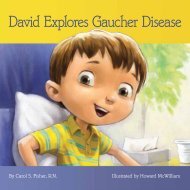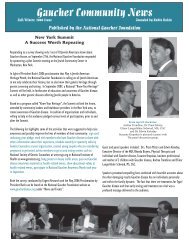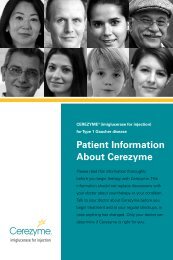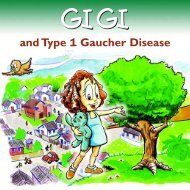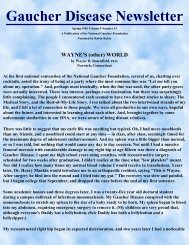Gaucher Community News - National Gaucher Foundation
Gaucher Community News - National Gaucher Foundation
Gaucher Community News - National Gaucher Foundation
- No tags were found...
You also want an ePaper? Increase the reach of your titles
YUMPU automatically turns print PDFs into web optimized ePapers that Google loves.
Bringing Hope to People with <strong>Gaucher</strong> isease<br />
Submitted by Genzyme<br />
When it comes to helping patients with rare genetic<br />
diseases, discovering and developing effective treatment<br />
is just the beginning. Once a treatment is fully developed<br />
and the necessary clinical trials have been completed,<br />
regulatory agencies such as the Food and Drug<br />
Administration (FDA) must review all of the information<br />
about the safety and efficacy of the drug and approve it<br />
for use. Then, depending on the health care system in the<br />
country, an agreement to pay for the cost of the medicine<br />
must be reached, usually through either a governmentsponsored<br />
healthcare plan or private insurers. The more<br />
uncommon a disease is, the higher the treatment cost for<br />
a single patient usually is, which means that patients with<br />
rare diseases may not be able to afford treatment on their<br />
own.<br />
In countries with an advanced healthcare infrastructure,<br />
a means is usually found to pay for most drugs that have<br />
been shown to be safe and effective. However in socalled<br />
“emerging markets” – nations whose economy or<br />
healthcare infrastructure are still developing – it may be<br />
that no one can afford to pay for the cost of treatment or it<br />
is difficult to get the necessary insurance.<br />
Genzyme introduced the first treatment approved for<br />
<strong>Gaucher</strong> disease in 1991. From the beginning, Genzyme<br />
leaders knew that just developing ground-breaking<br />
therapies would not be enough to treat the people in the<br />
world affected by <strong>Gaucher</strong> disease. And that was exactly<br />
what our goal was – to help all people with <strong>Gaucher</strong> have<br />
access to safe and effective treatment.<br />
In the early days, treatments were available only in the<br />
United States and some European countries. Eventually<br />
we opened offices in more than 40 countries around the<br />
world. In each country, we work closely with regulators,<br />
health administrators, insurers, clinical experts and patient<br />
organizations to gain approval and pay for the cost of<br />
therapy.<br />
From the early days, we knew there would be <strong>Gaucher</strong><br />
patients who could not afford treatment, and we looked<br />
for ways to make sure these patients could be treated.<br />
Eventually it became clear that we needed a large-scale,<br />
global program to improve patients’ access. In answer<br />
to this need we developed the Genzyme Humanitarian<br />
Program. This program provides patients with <strong>Gaucher</strong>,<br />
Fabry, Pompe, and MPS I diseases with Genzyme products<br />
free of charge. Genzyme distributes the product through a<br />
large international infrastructure.<br />
The Humanitarian Program is guided by an expert<br />
medical committee who makes patient treatment<br />
decisions, monitors and reviews patient progress, and<br />
advises local treating physicians regarding patient care<br />
as well as a board that recommends and approves those<br />
requests.<br />
In designing the Humanitarian Program, Genzyme<br />
knew that we needed to create something that we<br />
could support for the long term. We knew we could not<br />
provide free drug to every patient and still keep our<br />
business going. Therefore we have worked carefully<br />
to set limits and priorities for the Program that allow<br />
us to help patients over the long term. To do this, the<br />
Genzyme Humanitarian Program does more than<br />
provide free drug to patients. It works with physicians,<br />
patient advocates, and government organizations to<br />
increase understanding of rare genetic diseases and<br />
to build sustainable healthcare systems in developing<br />
countries. Currently more than 700 patients in countries<br />
across the globe benefit from the program.<br />
Genzyme’s commitment to our Humanitarian Program<br />
has always been unwavering. During the supply shortage<br />
one of the first decisions that we made was to disregard<br />
charitable status when allocating drug. This means that<br />
patients who receive treatment through our charitable<br />
access programs were allocated drug in the same way as<br />
other patients.<br />
We still have a long way to go in our mission to make<br />
sure that all people with <strong>Gaucher</strong> have access to a safe<br />
and effective treatment. Our supply problems interrupted<br />
access to treatment for patients around the world. And<br />
there are still people with <strong>Gaucher</strong> disease whose illness<br />
goes undiagnosed, who don’t even know that treatment<br />
is possible.<br />
We are working hard to overcome these challenges.<br />
We have new manufacturing facilities coming online<br />
that will greatly expand our capacity to make protein<br />
therapies. We work with the <strong>Gaucher</strong> Registry to<br />
expand awareness of <strong>Gaucher</strong> disease so that more<br />
physicians can recognize the symptoms of <strong>Gaucher</strong>.<br />
And we continue to expand our operations into more<br />
countries, working in each one to develop a healthcare<br />
infrastructure that will allow full and sustainable access<br />
to treatment for all.<br />
For more information, consult your physician. You can<br />
also contact Genzyme at 1-800-745-4447 (option 2).<br />
17




